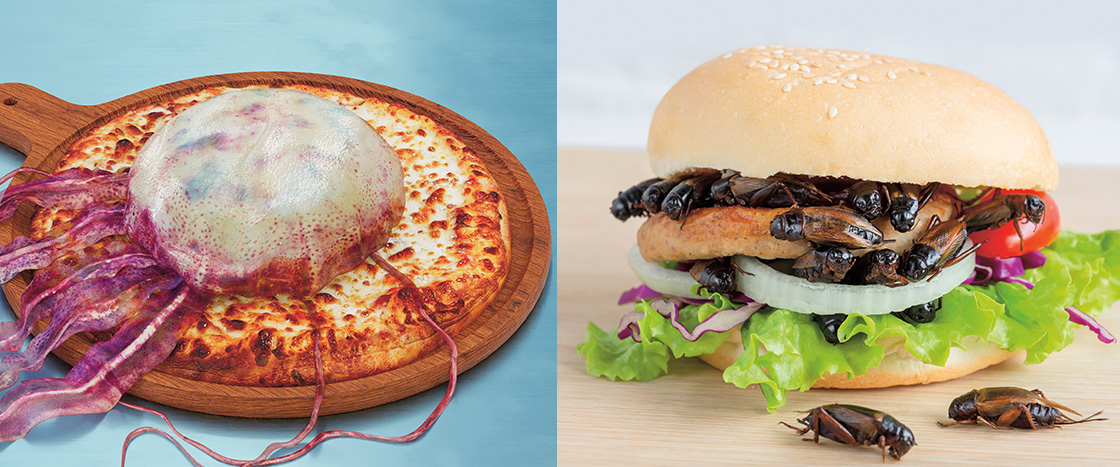A squishy jellyfish with stringy tentacles. A crunchy insect with six jointed legs. In some parts of the world, you can find these creatures on a menu! Both are healthy foods for people and safer for the planet than most meat choices. Between a jellyfish pizza and a bug burger, which would you eat?

Would You Rather Eat a Jellyfish Pizza or a Bug Burger?
If you had to choose one to chow down on, which would it be?
Learning Objective: Students will gather information about eating jellyfish and insects and use it to support an argument.
JELLYFISH PIZZA
PETER MCDONNELL
Jellyfish are 95 percent water. Edible species include moon jellyfish and the Japanese sea nettle.
LOCAL FAVORITE
Shutterstock.com
Jellyfish is a popular dish across much of Asia. It’s often cut into thin strips and served as a cold salad. In Japan, you can order jellyfish sushi!
SERVING SUGGESTION
Pizza places don’t often serve jellyfish. If they did, it would probably be fried as a crunchy topping similar to calamari—a popular Italian dish made from slices of salted squid.
HOW IT TASTES
Jellyfish has a mild, salty flavor. Most people eat it for the texture. It’s both chewy and crunchy!
WHY YOU MIGHT WANT TO TRY IT
In the waters near some parts of the U.S. and Europe, jellyfish numbers are rising fast. Scientists think warmer temperatures caused by climate change are creating these population blooms. During blooms, thousands of jellyfish can clog boat propellers and crowd out native fish species. Eating them helps reduce their numbers. Plus, jellyfish are rich in protein. It helps your body grow!
BUG BURGER
PETER MCDONNELL
Edible insects include several species of crickets, ants, and scorpions.
LOCAL FAVORITE
Shutterstock.com
More than 2 billion people in 123 countries eat insects regularly. In Brazil, you can dip ants in chocolate. In China, you can bite into a crunchy scorpion on a stick!
SERVING SUGGESTION
Food-safe insects are often used as a crunchy topping. You could order fried mealworms—a type of beetle larva—to sprinkle on your burger. Or you could try a patty made with ground-up crickets.
HOW IT TASTES
Many insects have an earthy flavor, similar to mushrooms. Some, like mealworms, have a nutty taste. Most adult insects are crunchy because of their exoskeleton, or outer shell.
WHY YOU MIGHT WANT TO TRY IT
It takes a lot less land, water, and food to farm insects than to raise cows or pigs for meat. Insects also produce less pollution. In fact, crickets create 3,000 times less greenhouse gases than cows. Greenhouse gases get trapped in our atmosphere and cause warmer temperatures around the globe. Most insects also have just as many healthy nutrients as beef or pork. The result? Food that’s good for you and for Earth!
Which would you rather have?
Which would you rather have?
Which would you rather have?
1. PREPARE TO READ (5 minutes)
Make an initial choice and explain the reasoning behind it.
- If needed, explain the “Would You Rather . . . ?” game. In this game, a person must make a tricky choice between two things. There isn’t a “right” answer, but you must choose one and defend your choice. Project the opening pages of the article, reading the captions aloud. Then ask students: Would you rather eat a jellyfish pizza or a bug burger? Let students record their initial choice and jot down one or two sentences about the reasoning behind their decision.
2. READ AND EVALUATE (20 minutes)
Gather information and discuss text evidence.
- Play the video “Would You Rather Eat a Jellyfish Pizza or a Bug Burger?” Give students time to change their choice and/or add any new information from the video to their reasoning. Designate one side of the room “jellyfish pizza” and the other side “bug burger.” Tell students they’re allowed to change their mind later, but for now they should go to the side that matches their choice. Do a quick tally of each side and record it on the board. Then have students return to their seats.
- Read the article aloud or have students read it independently. Compare sections with the same titles, like “Local Favorite” and “How It Tastes.” Ask: What information did you find most surprising or interesting? (e.g., Jellyfish have a mild, salty flavor.) Let students discuss in pairs. Then reconvene as a class and ask for volunteers to share.
- Ask: Did your original choice change? If so, why? Remind students that new information can change one’s mind—and that’s OK! As we learn more, our thinking often changes.
3. RESPOND TO READING (20 minutes)
Write and evaluate an evidence-based opinion.
